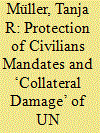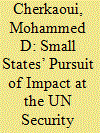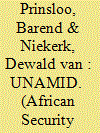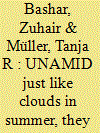| Srl | Item |
| 1 |
ID:
145024


|
|
|
|
|
| Summary/Abstract |
How are UN peacekeepers recruited? While we know a lot about UN member states’ general predispositions to participate in UN peacekeeping operations, we know very little about the actual UN force generation process. What role do the UN and its powerful member states play in this process? How do they interact to recruit UN forces? This article seeks answers to these questions by means of an in-depth case study of the force generation process for the UN–AU operation to Darfur (UNAMID). The case study relies on over 50 interviews with high-level decision-makers as well as newly declassified documents from the National Security Archive in Washington, DC. Overall the case study depicts a tantalizing division of labour between the technical expertise of the United Nations and the political power of key UN member states. It appears that UN peacekeeping contributions sometimes require the provision of financial and/or other incentives that go beyond regular UN reimbursements. As a result, powerful UN member states need to step in. However, UN officials play an important brokerage role in this process informing interested UN member states which countries would be suitable for bilateral démarches and why.
|
|
|
|
|
|
|
|
|
|
|
|
|
|
|
|
| 2 |
ID:
174331


|
|
|
|
|
| Summary/Abstract |
This article contributes to refining our understanding of how a robust Protection of Civilians mandate in peacekeeping missions may have unintended and harmful consequences for key local actors involved. It focuses specifically on local mission staff employed to collect vital data on human rights abuses, taking the example of the hybrid UN-African Union (AU) peacekeeping mission in Darfur, UNAMID. It further explores how the UN system lacks a clear policy or automatically built-in mechanisms to prevent potential harm to those on whose local knowledge it relies. While predominately based on interview data with a small number of former UNAMID frontline human rights data-collectors from Darfur, the dynamics unveiled speak to more general issues when interrogating protection of civilians as the central pillar of UN peacekeeping missions, also beyond scenarios where the government of a host-state is hostile to the mission. The article concludes that the protection of local staff should feature prominently in any mission’s approach, including an active commitment to withdraw staff from their positions if their security is threatened or compromised.
|
|
|
|
|
|
|
|
|
|
|
|
|
|
|
|
| 3 |
ID:
192921


|
|
|
|
|
| Summary/Abstract |
In an uncharted era of the COVID 19 pandemic dilemma, Tunisia, a small nation in North Africa, served as an elected member of the Security Council in 2020-2021. The temporal framework of this Tunisian experience coincided with two variables: a. multilateralism has again come under pressure, and b. great power tensions have returned to the Security Council in the last decade. This paper aims at assessing Tunisia’s claim of a ‘successful’ record over its two-year term, and entails the exploration of what factors and stimulants, as well as constraints and challenges, were promising or degrading for a small state to engage and try to make a difference in the UNSC decision-making process. The paper also explores whether Tunisia embraced a potential well-structured African approach to working with the E10 and navigating the nuances of the P5.
|
|
|
|
|
|
|
|
|
|
|
|
|
|
|
|
| 4 |
ID:
141433


|
|
|
|
|
| Summary/Abstract |
This article examines the geopolitical dynamics associated with the African Union (AU) and United Nations hybrid operation in Darfur (UNAMID) from the start of the Darfur conflict in 2003 until the time when UNAMID became fully operational in 2011. It provides an overview of the complex forces and geopolitical dynamics that affected the deployment of UNAMID and shaped its unique hybrid character. It mainly highlights those primary geopolitical factors that hindered the full deployment of UNAMID. It is concluded that this period was a showcase for the newly established AU and its support for its member states, as well as a new approach for the international community to maintain international peace and security in alliance with regional organisations.
|
|
|
|
|
|
|
|
|
|
|
|
|
|
|
|
| 5 |
ID:
155687


|
|
|
|
|
| Summary/Abstract |
Based on fieldwork carried out as part of the Making Peace Keeping Data Work for the International Community Project, this article considers how local perceptions of conflict dynamics interact or fail to interact with incident reporting in UN peacekeeping missions. Interrogating encounters of the hybrid United Nations/African Union Mission in Darfur (UNAMID) with local populations through interview data collected among Darfurian refugees in Chad, the article posits that localized perceptions of conflict differ in important ways from interpretations by UNAMID. It further argues that in order to effectively carry out the core mandate of protecting civilians, the systematic inclusion of local knowledge into UN-produced data sets is vital for any UN peacekeeping mission.
|
|
|
|
|
|
|
|
|
|
|
|
|
|
|
|